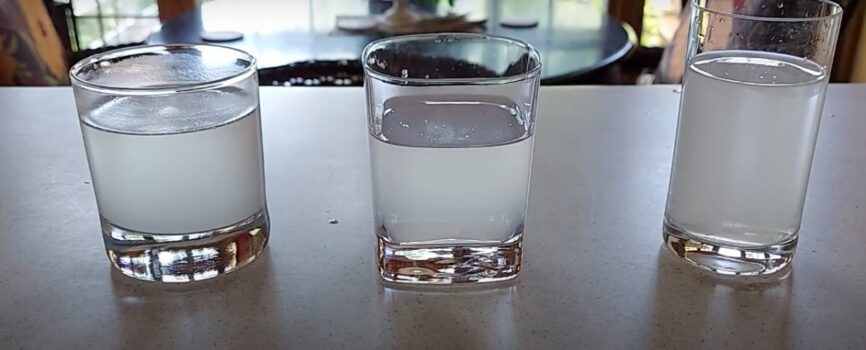Well water can appear gray due to various reasons. Mostly gray water is harmless but it feels gross to drink, bathe or wash dishes. Let’s check out the common reasons and solutions why your well water got gray.

5 Reasons why your Well Water is Gray
Air in the System
Excessive air in your home’s plumbing system can make water gray, milky, or cloudy. The common symptom of air in your home’s pipes is a banging and knocking sound when you use water appliances. You can also check this by keeping a glass of gray water in the refrigerator for some time. If the gray color vanishes, there is air in your home’s water supply.
Solution: Locate every water outlet (cold and hot) in your home, including faucets, bathtubs, showers, sinks, outdoor faucets, appliances, and toilets. Start by opening the lowest faucet and then move to the highest faucet to about 1/8th of the total capacity. Let the water run for about 2-3 minutes. It allows the build-up air to escape from the water pressure. Flush every toilet 1-2 times and run appliances during this practice.
Related Guide: 9 Causes of Air in Well Water Lines and Their Solutions
Hard Water Buildup
Most private wells have hard water. Hard water doesn’t only impact your skin, hair, and appliances. It can also sometimes change how your water appears. The hard water buildup, mainly calcium, magnesium, and iron, gets dislodged from plumbing and enters the water supply from time to time. The possibility is even higher if you serviced your well system recently.
You can notice scale deposits as gray or white particles floating in the water. If this is the case, the culprit is hard water.
Solution: Soft water rarely gets gray due to hard water deposits. Installing a water softener for your well water is the most effective way to make water soft and get rid of gray water. A salt-based water softener is recommended for private wells, but some people also install salt-free softeners. However, a salt-free softener (water conditioner) requires iron-free water to function properly.

Bacterial Contamination
A common reason well water appears gray is bacterial contamination. Sulfur bacteria are responsible for well water turning gray, black, reddish brown, or white. Sulfur bacteria are usually harmless, but their presence indicates high levels of hydrogen sulfide and sulfur in well water. These two add a rotten egg smell, making the water undrinkable and harmful if present in high concentration.
Solution: The most effective way to eliminate sulfur or any other bacteria, viruses, or algae from well water is shock chlorination. You can install a chemical injection system, but it is costly and requires frequent maintenance. Chlorination is cheap and lasts for 3-5 years. It is better to arrange bottled water as you have to wait for at least 1-2 days before using well water after chlorination.
Fungal/Algae Growth
Fungal or algae growth can also make well water gray. Fungal/algae growth inside the well or your home can make well water gray. Fungus on shower curtains, showerheads, bathroom and kitchen tiles, washing machines, and toilets can grow on water outlets and make water gray.
Solution: Shock chlorination kills fungus and algae inside the well. You can use a commercial fungus and algae cleaner to eliminate colonies elsewhere.
Septic Tank Problems
Well water can also get gray if a sewer line from septic tank seeps into the well. It is a dangerous situation, and you must stop using water immediately if this is the case.
Solution: Such problems generally don’t happen if the well has been constructed per local laws. The minimum distance from a septic tank to a water well is 50 feet. You can call your well contractor to find out more about this issue.
Why is my Well Water Gray and Smelling like Rotten Eggs?
Well water is gray and smells like rotten eggs due to the presence of sulfur bacteria and hydrogen sulfide. You can chlorinate your well to eliminate the rotten egg smell from cold water taps. The rotten egg odor from the hot water tap is a water heater problem. The bacterial growth inside the water heater adds a rotten egg smell. You can service your water heater or replace the anode rod if the problem persists.
Do I need to test Well Water if it is Gray?
Yes. You must test the well water if it suddenly gets gray. A water test is the only reliable way to identify the reason behind the change in water quality. EPA recommends annual testing for all private wells. Moreover, a water test will help you get to the root cause and deal with it in the best possible way.
Do Water Filters remove Gray Color from Well Water?
It depends on the contaminant and filter’s capability. Some water filters may be able to remove the gray color from well water. However, most water experts recommend against using filters to fix the gray color problem.
Why is my Well Water Orange?
The common reason behind orange well water is excessive iron. Iron bacteria, ferric iron, and ferrous iron are the common types of iron that impart orange color to well water.
Why is my Well Water Yellow?
Well water gets yellow due to high concentrations of iron & manganese, iron bacteria, tannins, plumbing, and well structural issues.
Why is my Well Water Brown?
Iron, rust, tannins, silt, and damaged well structure can make well water brown. You can get well water tested to identify the reason behind brown well water.
